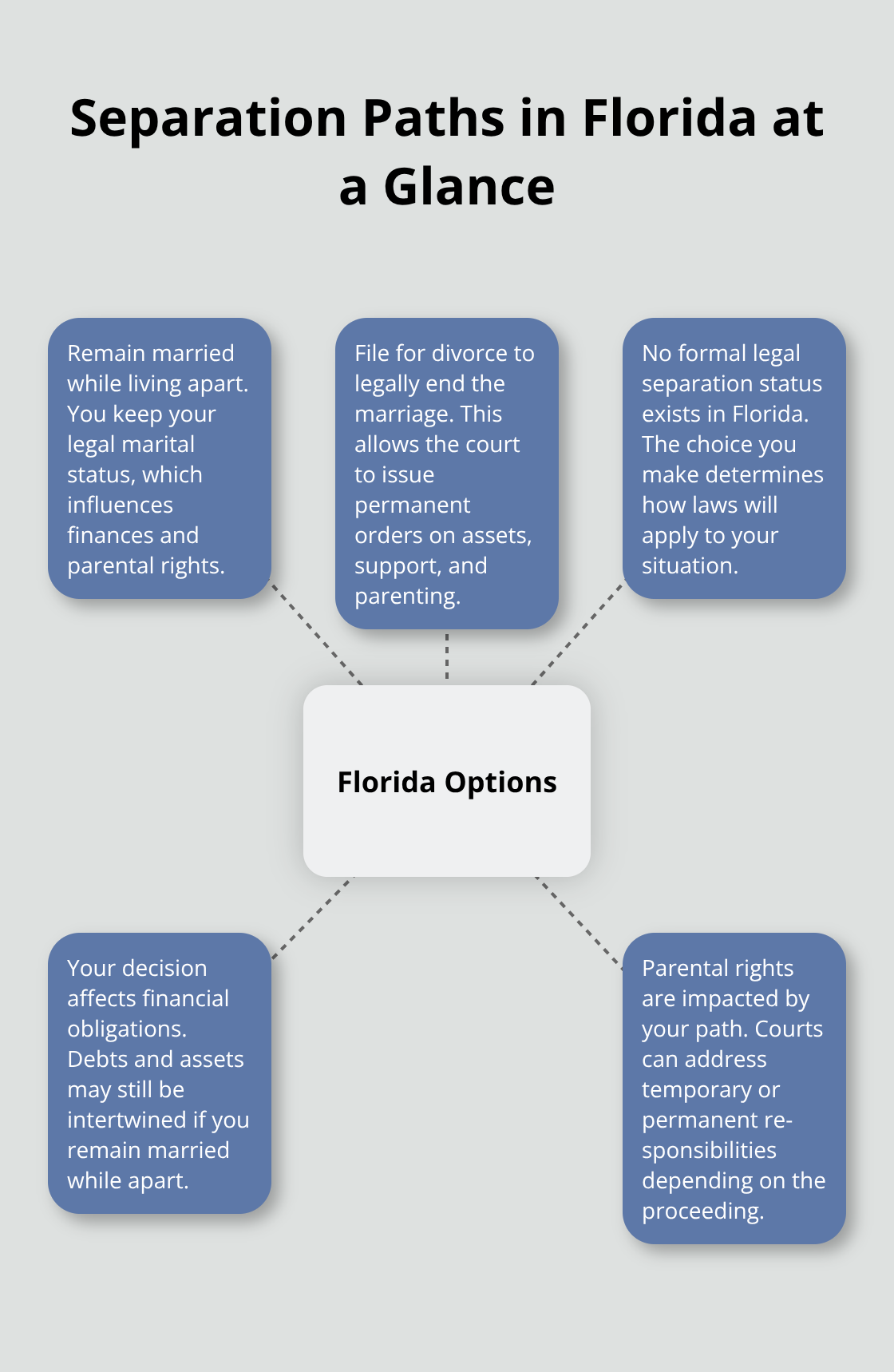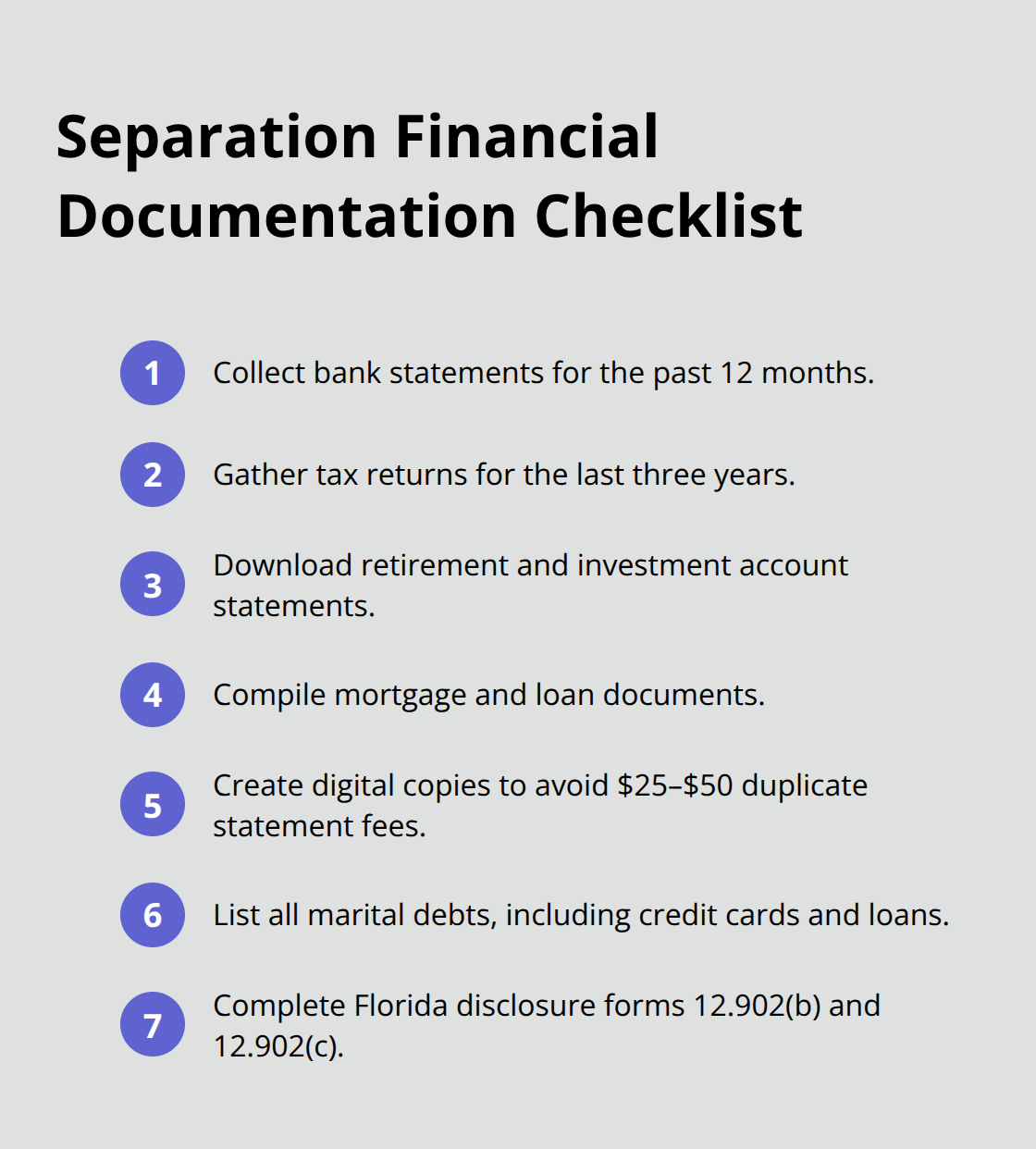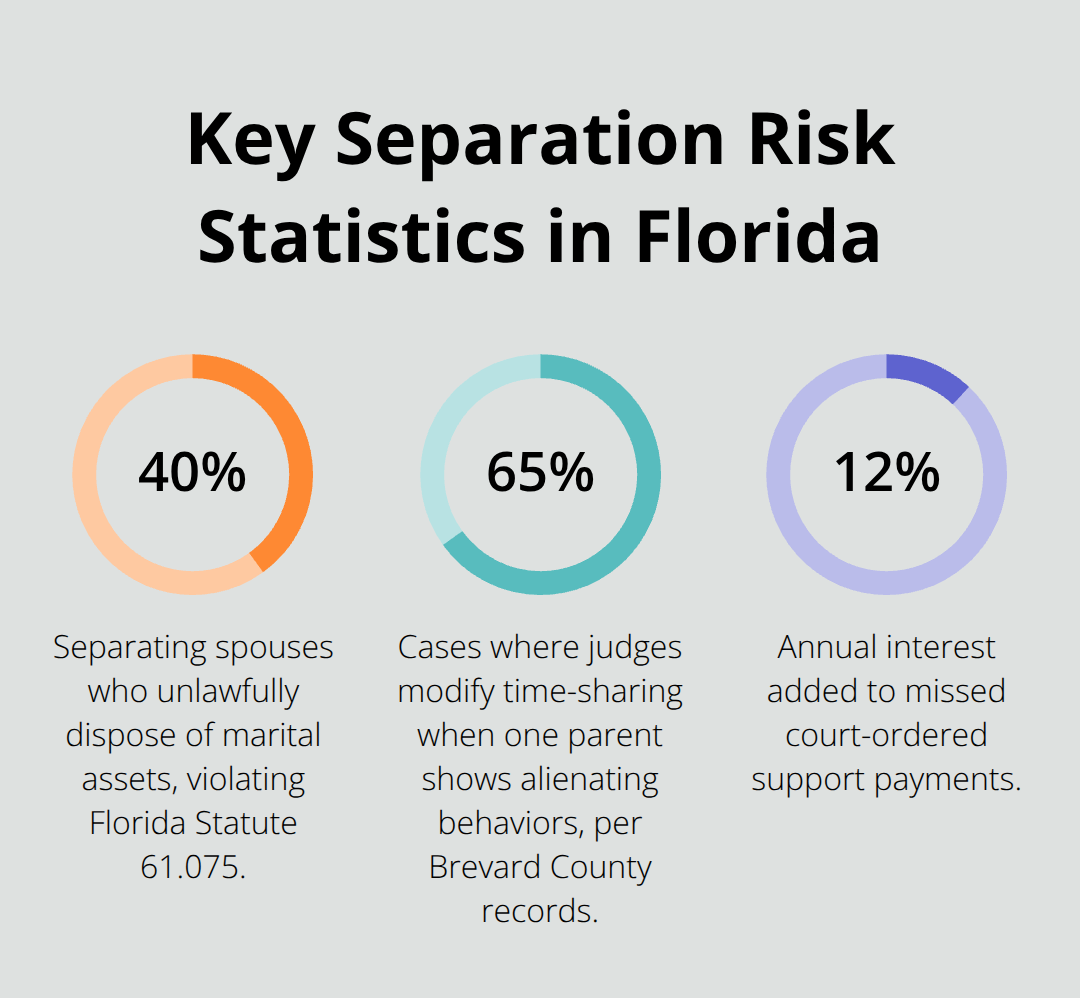How to Navigate Separation: Key Legal Considerations
Our Blog
How to Navigate Separation: Key Legal Considerations

Separation marks a turning point that affects every aspect of your life, from finances to children. The decisions you make during this period can impact your future for years to come.
We at Harnage Law PLLC understand that getting proper legal advice when separating protects your rights and prevents costly mistakes. This guide covers the key legal considerations that will help you move forward with confidence.
What’s the Difference Between Legal Separation and Divorce?
Florida’s Unique Approach to Separation
Florida operates differently from many states when it comes to legal separation. Florida law does not recognize formal legal separation as a distinct legal status. Instead, couples in Florida must choose between two options: remain married while they live apart or file for divorce to legally end their marriage. This distinction affects your financial obligations, parental rights, and legal status in significant ways.

Consequences of Remaining Married While Apart
When you live separately without a divorce filing, you remain legally married. This means you cannot remarry, you may still bear responsibility for your spouse’s debts, and you maintain inheritance rights. However, you can establish temporary agreements for child custody, support, and property division through the family court system.
The Divorce Process and Timeline
Divorce completely severs the marital relationship and allows the court to make permanent decisions about asset division, alimony, and parental responsibilities. The divorce process in Brevard County typically takes 4-6 months for uncontested cases, while contested divorces can extend 12-18 months (according to court statistics).
When Separation Without Divorce Makes Sense
Some couples choose to live apart when they need time to work on their relationship, have religious objections to divorce, or want to maintain health insurance benefits that would end with divorce. However, this approach leaves you legally vulnerable since your spouse can file for divorce at any time and you remain financially connected.
Understanding these fundamental differences helps you evaluate which path serves your specific situation best, but each option comes with distinct advantages and drawbacks that deserve careful consideration.
What Steps Must You Take During Separation?
Financial Documentation Requirements
Collect financial records immediately when separation begins. Bank statements from the past 12 months, tax returns for the last three years, retirement account statements, and mortgage documents form the foundation of your case. Florida courts require complete financial disclosure through mandatory forms 12.902(b) and 12.902(c), and incomplete documentation can delay proceedings by months.

Create digital copies of credit card statements, investment portfolios, and business records since financial institutions typically charge $25-50 for duplicate statements. Document all marital debts including credit cards, loans, and mortgages, as Florida follows equitable distribution laws that divide both assets and liabilities acquired during marriage.
Temporary Child Custody Arrangements
Florida courts prioritize the best interests of children and expect parents to maintain stability during separation transitions. File for temporary time-sharing immediately if you cannot reach agreements with your spouse, as delays can establish unfavorable patterns that courts may continue permanently. The state requires parenting plans that address daily schedules, holiday rotations, and decision-making responsibilities for education and healthcare. Courts in Brevard County typically schedule emergency hearings within 30 days for urgent custody matters, but standard temporary relief can take 60-90 days. Document your involvement in children’s activities, school events, and medical appointments since courts examine each parent’s historical participation when making temporary orders.
Separation Agreement Necessities
Draft comprehensive separation agreements that address immediate concerns while you navigate the legal process. These agreements should cover temporary spousal support, bill payment responsibilities, and use of the marital home. Florida law allows couples to create binding contracts that courts will enforce if properly executed (with both parties having legal representation). Include specific provisions about debt payments, insurance coverage continuation, and restrictions on major purchases or asset transfers. Set aside time to discuss all aspects of your separation calmly and rationally. If direct communication proves challenging, consider using a mediator to facilitate productive conversations. Courts rarely modify well-drafted separation agreements, making thorough preparation vital for protecting your interests throughout the separation period.
While these steps provide structure during separation, many couples make costly mistakes that can jeopardize their future financial security and parental rights. Experienced attorneys in Melbourne, FL can guide you through the process and protect your rights during this challenging time.
What Mistakes Could Destroy Your Separation Case
Financial Decisions That Backfire
Major financial moves during separation without legal guidance destroy more cases than any other single mistake. Florida Statute 61.075 prohibits disposal of marital assets without court approval or spousal consent, yet 40% of separating spouses violate this rule according to Florida Bar statistics. Transferring money between accounts, selling property, or taking on new debt can result in contempt of court charges and financial penalties that exceed $10,000. Courts view unauthorized asset transfers as deliberate attempts to hide money, which triggers forensic accounting investigations that cost $15,000-25,000 (which you may have to pay). Stop all non-essential spending immediately and avoid opening new credit accounts, refinancing loans, or making investment changes without written agreements or court orders.
Using Children as Weapons
Parents who manipulate children during separation face severe legal consequences that permanently damage their custody rights. Florida courts impose sanctions including supervised visitation, mandatory counseling, and attorney fee awards against parents who involve children in adult conflicts. Brevard County family court records show judges modify time-sharing arrangements in 65% of cases where one parent demonstrates alienating behaviors like badmouthing the other parent, restricting phone calls, or using children to deliver hostile messages.

Courts consider parental alienation a form of emotional abuse that violates Florida Statute 61.13, which prioritizes the child’s relationship with both parents. Document any attempts by your spouse to manipulate your children, but never retaliate with similar tactics since courts punish both parents equally for engaging in harmful behaviors.
Violating Temporary Orders
Breaking temporary court orders during separation leads to immediate legal consequences that can include jail time and substantial fines. Florida courts issue temporary orders within 30 days of filing that address child custody, support payments, and property use until final hearings occur. Violating these orders constitutes contempt of court under Florida Rule of Family Law Procedure 12.615, with penalties including wage garnishment, asset seizure, and incarceration for up to 179 days. Pay all court-ordered support on time since missed payments accumulate interest at 12% annually and cannot be discharged in bankruptcy. Follow temporary custody schedules exactly as written, maintain required insurance coverage, and avoid contact violations that could result in domestic violence injunctions that affect your case permanently.
Final Thoughts
Separation involves complex legal decisions that affect your financial future and parental rights for years to come. The mistakes outlined above demonstrate why legal advice when separating protects you from costly errors that could permanently damage your case. Florida’s unique approach to separation, combined with strict court requirements and severe penalties for violations, makes professional guidance essential rather than optional.
Courts make permanent decisions based on temporary patterns established during separation, which means every action you take now influences your final outcome. Strategic thinking about asset protection, custody arrangements, and financial stability becomes vital for your post-separation future. We at Harnage Law PLLC provide aggressive representation to protect your rights throughout the separation process.
Immediate action prevents problems from escalating into expensive legal battles (which can cost tens of thousands of dollars). Document everything, follow court orders precisely, and avoid financial decisions without proper guidance. Your future depends on the choices you make today, and experienced legal counsel helps you navigate this challenging period while positioning yourself for the best possible outcome.
